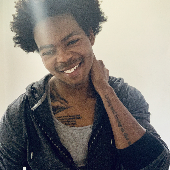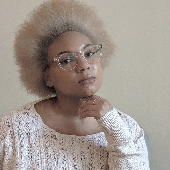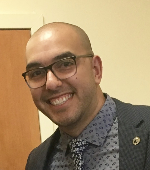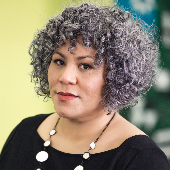
Northwestern builds new depth in African American literary studies
Four new literature scholars join the departments of English and African American Studies
By Rebecca Lindell
In a move that will significantly elevate the study of African American literature at Northwestern, the Weinberg College of Arts and Sciences has welcomed four new scholars who are exploring new and exciting themes in this field.
The new assistant professors are Marquis Bey, Lauren Jackson, Justin Mann, and Nicole Spigner, each appointed to joint positions across the departments of English and African American Studies.
Each of the scholars brings a fresh perspective to the study of African American literature and culture. Together, their research covers a wide variety of genres, eras and archives and spans more than 150 years of African American fiction, nonfiction, poetry, music and other cultural expressions.
This “cluster hire” will create an unprecedented depth and breadth in African American literary studies at Northwestern, said Associate Professor of English and Gender & Sexuality Studies Nick Davis, who chaired the faculty committee that conducted the search.
“This is a field that our students have repeatedly voiced their keen interest in,” Davis said. “It’s the area that we felt most motivated to expand into, in terms of faculty specialization.”
Breadth and diversity
The four scholars explore a sweeping array of topics.
- Nicole Spigner specializes in Black Classicism and literature of the long 19th century. Her work interrogates issues of the turn-of-the-20th century, proto-Black feminism and Black feminine identity formation.
- Marquis Bey researches Blackness, Black feminism, transgender subjectivity and anarchism.
- Lauren Jackson focuses on the aesthetics of racial feeling, particularly Black feeling, in 20th and 21st-century American literature and culture.
- Justin Mann researches Black speculative fiction, Black feminist theory and Blackness in relation to national and global security.
Many faculty at Northwestern touch on African American literature in their research and teaching. But relatively few, Davis said, are focused squarely on that area.
“As with any field, it’s so important to show students that you can inhabit the same discipline and confront ideas in different ways,” Davis said.
“Courses like Introduction to African American Literature deserve to be taught from different perspectives year by year, and not just be the province of one person,” he added. “We don’t teach Introduction to British Literature that way, and we don’t teach American Literature that way. We need breadth and diversity within this field.”
Seizing an opportunity
Initially, the Department of English intended to hire just one tenure-track scholar with a focus on African American studies. But the sheer number of impressive candidates soon raised the question of whether the English department could hire at least two.
“When all four of our finalists gave such stellar presentations, the choice ahead felt uniquely difficult,” Davis said.
English department chair Laurie Shannon thus approached E. Patrick Johnson, chair of African American Studies, to see whether that department might want to join in the initiative. “They were just as excited as we were,” Shannon said.
Johnson, whose department had several open tenure-line faculty positions to fill, eagerly agreed.
“All of these individuals will bring something very different to the University,” Johnson said. “Even though they are all trained in literature, that is not the only thing that they do. They will create connections between our departments, as well as to areas that we’ve never been connected to.”
While Bey and Spigner will be based in the Department of African American Studies, they will also teach one course per year in the Department of English. Likewise, Jackson and Mann will teach one course annually in the Department of African American studies.
The collaboration will create a powerful synergy between the two departments, Davis said.
Active questions
“African American literature is an area where the relationships between artistic and literary production and critical and theoretical work are really tight,” Davis said. “Black feminists like Alice Walker and Toni Morrison and bell hooks and Audre Lorde have always combined the scholarly and the creative, so this is a logical place for two departments who are invested in fiction and creative work and in the histories of ideas and criticism to invest.
“The questions that are being explored — all the way from the mid to late 19th century, through the Cold War, through the Civil Rights era, through the 21st century, remain for better or for worse such active questions in our culture.”
As an example, Davis cited the work of Spigner, who draws connections between the Greek and Roman classics and African American literature in the late 1800s. Figures such as the wailing mother Niobe, for example, speak not only to the struggles of Black women in the late 19th century but also to the grief of the African American mothers of today who have lost children to gun violence.
“The kinds of questions she is asking are questions that can be applied to a different era,” Johnson said.
Illuminating the present
Johnson also cited the work of Bey, whose research on transgender issues bridges African American studies and gender and sexuality studies.
“Even though it wasn’t called ‘transness’ in the 19th century, there were still Black figures who were gender-nonconforming,” Johnson observes. “We might not think there were these figures in earlier periods, since we are so focused on the present. But they were there, and we can see how they laid the groundwork for some of the things that are happening in our culture today. And they tell us so much about why we have a particular aesthetic form today – we can trace it back to an earlier era. ”
Davis anticipates that the four scholars will spark conversations that will reverberate across the Northwestern campus.
“I think this initiative could not be more timely,” Davis said. “We’re making a robust case that literature, in multiple genres, remains a crucial way to understand history, culture and politics.”
Back to top


